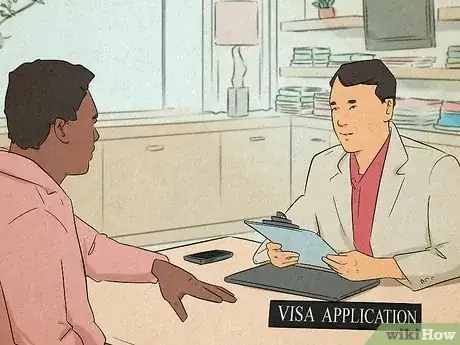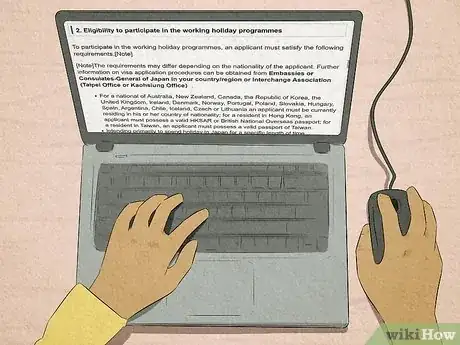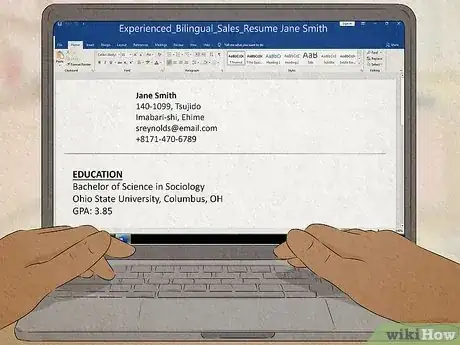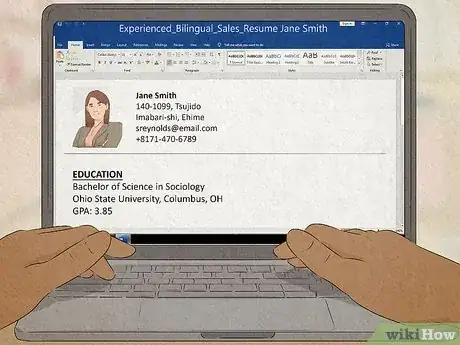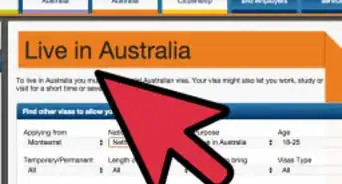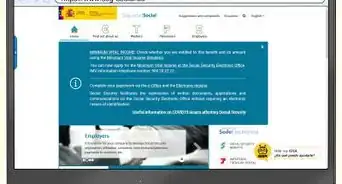This article was co-authored by Lorenzo Garriga. Lorenzo is a time-tested globe-trotter, who has been traveling the world on a shoestring for almost 30 years with a backpack. Hailing from France, he has been all over the world, working in hostels, washing dishes, and hitchhiking his way across countries and continents.
There are 22 references cited in this article, which can be found at the bottom of the page.
This article has been viewed 55,487 times.
Japan is a wonderful, vibrant country with a booming economy. Whether you want to teach English or you're looking for part-time or full-time employment in Japanese businesses, you can achieve your dream of a rewarding international job experience with some dedication and hard work.
Steps
Getting a Job Teaching English
-
1Determine whether you meet the requirements. If you don’t speak Japanese, which is a requirement for most jobs in Japan, then a great way to work in the country is to teach English. Even if you do speak Japanese, you may want the rewarding experience of teaching overseas.
- You will need a bachelor’s degree (not an associate's degree) in any subject and possibly a TEFL (Teaching English as a Foreign Language) or TESOL (Teachers of English to Speakers of Other Languages) certification. You can get certified as an English language teacher in about three months.[1] Get certified via online or in-person courses. Visit the TESOL or TEFL websites to find accredited classrooms near you.
- You will need to pass a criminal background check and possibly a drug test.[2]
-
2Get a teaching placement in a public school. One way of finding a teaching job in Japan is through a program such as the Japan Exchange and Teaching Program (JET). This is run through the Japanese government and places qualified candidates as Assistant Language Teachers in public schools across the country.
- Participants sign a 1-year contract and can spend a maximum of 5 consecutive years in the program.
- You can apply for the program through an online portal during the fall. Your application will need to include the application form, a medical form indicating that you’re in good health, your university transcripts, proof of degree, a 2-page essay explaining why you want to participate in the program, two letters of reference, and proof of American citizenship. It is a very competitive program so not all applicants will be accepted.[3]
Advertisement -
3Apply to teach in a private language school. There are hundreds of private schools offering English classes throughout the country. Typically, you will apply for a teaching position online through the school’s website and be interviewed via Skype if you’re a promising candidate.[4]
- Search online for private schools and visit their websites to see if they're hiring. You can also check for job advertisements on Japanese job sites like Gaijinpot.[5]
- Make sure the school is legitimate by doing online searches to turn up any negative stories about it. Watch out for red flags. For example, if the school asks you to come over on a tourist visa, promising proper credentials later, do not accept the position. Don't agree to do any 'volunteering' work before your visa is approved either.[6]
-
4Apply for your work visa at your local embassy. Once you’ve been offered a teaching job, you need to apply for a work visa in order to enter Japan. The work visa is specific to the job you’ve been hired for and is not a blanket permission to work anywhere in Japan.
- You can find the nearest Japanese embassy by searching online or consulting this guide to Japanese consular office locations if you live in the United States: https://www.us.emb-japan.go.jp/jicc/consulate-guide.html.
- Once you’ve been hired, your employer will apply for a Certificate of Eligibility (COE) for you and mail it to you. Take the COE, your passport, a visa application form, and a photograph of yourself to your local Japanese embassy to submit your application. When your visa is ready, which could take about 5 days, you can pick it up at the embassy.[7]
-
5Register at your local government office. Once you arrive in Japan, you’ll need to register as a resident within 14 days. You’ll need your passport, your residence card, and a form.[8]
- If you arrive at one of the major airports, you'll receive your residence card there when you land. If you arrive at a smaller airport, you'll have to go to the local city hall to get it there. You'll be fingerprinted and have your photo taken, and receive a laminated card.
- Take your residence card and passport to your nearest government office, which you can find by searching online. You'll receive a form there on which you'll fill out your personal details and your new address. You'll turn over your passport, residence card, and the form, and in about 30 or 40 minutes, your residence card will be returned to you with your address on the back. Later, you'll receive a social security and tax number by mail.
- Some government offices have interpreters but it's a good idea to bring somebody who speaks Japanese with you if you don't know the language, since you'll be asked some questions.[9]
Getting a Part-Time Job
-
1Go to school in Japan. Foreigners in Japan on student visas can obtain part-time employment in the country. You cannot automatically work as a student, however, so you’ll need to apply for a work permit once you arrive in Japan.[10]
- Once you've been accepted to a school, they'll send you a COE, student visa application form, 2 passport-sized photographs, and your valid passport to your nearest Japanese embassy or consulate. You'll receive your passport, stamped with your student visa, in about 3 to 7 days.[11]
- Submit your application for a work permit at your local application bureau. The application will take about 3 weeks to process. Your work permit expires at the same time as your student visa.[12]
- Students are not allowed to work more than 28 hours per week or more than 8 hours on holidays.
- Foreign students are not allowed to work in places that “affect public morals,” such as bars, nightclubs, or establishments that allow gambling.[13]
-
2Find out if you're eligible for a working holiday visa. As of September 1, 2018, Japan has bilateral arrangements with 21 countries, including Australia, Canada, and the United Kingdom (but not the United States) allowing young people between the ages of 18 and 30 from these countries to work part-time while they are spending holidays in Japan for up to 12 months.
- In order to qualify for this visa, you must demonstrate that you have reasonable funds for the duration of your travel and enough money to purchase a return ticket home. You cannot bring any dependents with you.
- You also have to prove that you’re in good health with medical certificates.
- As with a student visa, a working holiday visa does not permit you to work at establishments “affecting public morals” such as bars, cabarets, and casinos.[14]
- Apply for this visa the way you would apply for a work visa, by submitting an application form and the necessary accompanying documents (passport, proof of funds, medical certificate, resume, written statement on the reasons you want the visa, and an outline of your planned activities in Japan) at the nearest Japanese embassy.[15]
- There is no limit to the number of hours you can work on a working holiday visa.[16]
-
3Search for part-time jobs on websites and in magazines. A lot of part-time jobs will be advertised on job search websites and in free magazines distributed at convenience stores and train stations. Townwork is a popular resource that is published as a magazine and has a website you can visit.[17]
- Restaurants, supermarkets, and convenience stores are all examples of places that offer baito (part-time jobs) to both Japanese citizens and foreigners. Remember that many of these jobs involve customer service, so you’ll need some proficiency in Japanese in order to get hired.[18]
- If you don’t speak Japanese, you can also look for work in customer service at tourism bureaus and department stores providing language support in languages other than Japanese. You could also search for a job in the popular new Eikaiwa Cafes (English Conversation Cafes), where you serve drinks and food and chat with the customers in English to help them improve their proficiency in that language.[19]
-
4Apply in person. Once you’ve found a business that is hiring in a part-time capacity, especially a restaurant or convenience store, your best bet is to simply walk into the establishment, ask if they are accepting applications, request an interview, and hope that you receive one.[20]
- It's a good idea to bring your passport with your visa stamped in it or your work permit to prove that you're eligible to work.
Getting a Full-Time Job
-
1Start learning Japanese, if you don’t speak it already.[21] Proficiency in the language will be key to getting full-time employment. Almost all professional jobs in Japan other than teaching English and some IT work require a Level 2 JLPT (Japanese Language Proficiency Test).
- The JLPT is a standardized test that all companies use to gauge the abilities of potential employees. The test has five levels, with Level 1 being the highest, so the minimum acceptable level of 2 indicates that you will need to be very proficient in Japanese to get hired at most jobs.[22]
- You can take Japanese classes at schools in your home country or in Japan if you’re already there on a student or working holiday visa, or as an English teacher. Being immersed in the culture and language will also help you pick it up faster.[23]
-
2Search Japanese job sites. A good place to start looking for jobs available to foreigners in various industries in Japan is on one of a few major websites: GaijinPot, Jobs in Japan, and Daijob are three of the largest and most helpful. These websites provide listings of available jobs, and some let you upload your resume and set job search alerts.[24]
-
3Make your resume stand out with a detailed file name. When you’re applying for a job, or uploading your resume to a job search site such as Jobs in Japan, you should bear in mind that potential employers are seeing thousands of uploaded resumes with standard file names like [Last Name] Resume. Try to make yours more eye-catching by adding in descriptors of your special skills.
- If you’re applying for a sales position, for instance, you could title your resume something like “Experienced_Bilingual_Sales_Resume” and your name. This gives you a leg up on your competition before the potential employer even opens your file.[25]
-
4Include a photograph of yourself on your resume. Although this may seem unusual to Western job applicants, in Japan it’s expected that you’ll include a picture of yourself with your resume or cover letter. This helps the employer put a face to a candidate and assess your professionalism.
- Make sure your photograph looks professional. You could try getting a professional headshot taken. Don’t use a selfie or a cell phone picture, or any picture in which you’re wearing casual clothing, flashing a peace sign, or looking unkempt.[26]
-
5Start networking. If you’re already in Japan, it’s important that you start cultivating contacts with people who can help you find a career. More people find jobs in Japan through networking than through job boards.[27]
- Join a professional association in the industry you are interested in, for example, the Japan Auto Manufacturers’ Association (JAPA) or the Japan Electronics and Information Technologies Industries Association (JEITA). These associations offer industry news and publications that often include job listings. They are also a great way to network with people in your field.[28]
- The after-work drinking culture is very important in Japan, so go out to bars with professionals and industry groups in your field of interest in order to get valuable face-to-face time with people who can help you find employment in your field.[29]
-
6Get an internship. Japanese internships are more like mentorships. Often the intern is not just unpaid, but actually pays to work in a Japanese company and receive coaching, advice, and encouragement. This is a great way to gain Japanese work experience and make valuable networking contacts.[30]
- You can search for internships online. The website Kopra specializes in East Asian companies offering internships. You can also draw on your university or professional association connections to help you find an internship. Some Japanese companies advertise for foreign interns on platforms such as Craigslist.
- To apply for an internship, you’ll need a resume and, in some cases, a cover letter.
- You can do a non-paid internship under 90 days on a tourist visa, or a longer internship on a student or working holiday visa.[31]
-
7Prepare for an interview. Whether you receive a job interview via Skype or in person, it’s important to make a good first impression. You should dress appropriately in business attire to make yourself seem professional and prepared. Be aware of differences between Western and Japanese cultural norms so that you don’t accidentally offend the interviewer or seem rude.
- Be extremely polite. Use correct Japanese body language – bow, rather than shaking hands, if the interview is in person. Avoid smiling too much, especially a broad, toothy smile, which seems fake or like a mask for embarrassment or anger to the Japanese. Keep your hands out of your pockets, since this pose signals insubordination and arrogance in Japan.[32]
- Don’t slouch, guzzle a drink, arrive late or too early, complain, or ask the interviewer any personal questions.[33]
-
8Apply for a work visa once you've been offered a job.[34] After hiring you, your company will send you a COE. Take this, your visa application, your valid passport, and a passport-sized photograph of yourself to your local Japanese embassy or consulate. If your application is approved, your passport will be returned to you with your visa in it. You have 3 months to enter Japan after your work visa is issued.[35]
- If all your documents are in order, average processing times are fewer than 5 days.
- There are several types of work visa divided by profession. Apply for the one that fits the job you've been hired for.[36]
Community Q&A
Did you know you can get answers researched by wikiHow Staff?
Unlock staff-researched answers by supporting wikiHow
-
QuestionWhat jobs are in demand in Japan?
 wikiHow Staff EditorThis answer was written by one of our trained team of researchers who validated it for accuracy and comprehensiveness.
wikiHow Staff EditorThis answer was written by one of our trained team of researchers who validated it for accuracy and comprehensiveness.
Staff Answer wikiHow Staff EditorStaff Answer
wikiHow Staff EditorStaff Answer -
QuestionHow can I get a job in Japan without speaking Japanese?
 wikiHow Staff EditorThis answer was written by one of our trained team of researchers who validated it for accuracy and comprehensiveness.
wikiHow Staff EditorThis answer was written by one of our trained team of researchers who validated it for accuracy and comprehensiveness.
Staff Answer wikiHow Staff EditorStaff AnswerYou can get a job without speaking Japanese, but it will limit your options a bit. One popular job option for people who don’t speak Japanese is working as an English teacher. Working for a foreign-owned company in an IT-related field is another option (for example, you might get by working for Amazon or Google in Japan without speaking Japanese). Artists, chefs, and people with other very specialized skills can also sometimes find work with little or no Japanese.
wikiHow Staff EditorStaff AnswerYou can get a job without speaking Japanese, but it will limit your options a bit. One popular job option for people who don’t speak Japanese is working as an English teacher. Working for a foreign-owned company in an IT-related field is another option (for example, you might get by working for Amazon or Google in Japan without speaking Japanese). Artists, chefs, and people with other very specialized skills can also sometimes find work with little or no Japanese. -
QuestionCan you live in Japan without a job?
 wikiHow Staff EditorThis answer was written by one of our trained team of researchers who validated it for accuracy and comprehensiveness.
wikiHow Staff EditorThis answer was written by one of our trained team of researchers who validated it for accuracy and comprehensiveness.
Staff Answer wikiHow Staff EditorStaff AnswerIt’s possible, but tricky. You'd need to have some way of supporting yourself. You can apply for residency in Japan if you already have the financial means to support yourself (e.g., if you’re independently wealthy), or you can marry a Japanese citizen and get a spousal visa. You could also potentially start a business in Japan and then hire someone else to manage it for you.
wikiHow Staff EditorStaff AnswerIt’s possible, but tricky. You'd need to have some way of supporting yourself. You can apply for residency in Japan if you already have the financial means to support yourself (e.g., if you’re independently wealthy), or you can marry a Japanese citizen and get a spousal visa. You could also potentially start a business in Japan and then hire someone else to manage it for you.
References
- ↑ https://matadornetwork.com/read/get-job-move-japan/
- ↑ https://www.internationalteflacademy.com/faq/bid/103906/what-are-the-basic-requirements-to-teach-english-in-japan
- ↑ https://www.internationalteflacademy.com/faq/what-is-the-jet-program-for-teaching-english-in-japan
- ↑ https://www.internationalteflacademy.com/teach-english-in-japan
- ↑ https://work.gaijinpot.com/working-in-japan/teaching-private-school/
- ↑ https://www.japantimes.co.jp/community/2015/10/07/issues/red-flags-exit-strategies-advice-english-teachers-japan/#.W-M88XpKjp4
- ↑ https://teflsearch.com/knowledgebase/japan/requirements-and-visa-information
- ↑ https://blog.gaijinpot.com/getting-your-japanese-residence-card/
- ↑ https://blog.gaijinpot.com/getting-your-japanese-residence-card/
- ↑ https://www.tofugu.com/japan/foreign-exchange-student-jobs/
- ↑ https://blog.gaijinpot.com/studying-japan-get-student-visa/
- ↑ https://www.tofugu.com/japan/foreign-exchange-student-jobs/
- ↑ http://si-ta.com/en/finding-part-time-job-in-japan/
- ↑ https://www.mofa.go.jp/j_info/visit/w_holiday/index.html
- ↑ https://fr.april-international.com/en/programme-vacances-travail/working-holiday-programme-whp-japan
- ↑ http://www.jawhm.or.jp/eng/work_faq.html
- ↑ http://si-ta.com/en/finding-part-time-job-in-japan/
- ↑ http://si-ta.com/en/finding-part-time-job-in-japan/
- ↑ https://www.tofugu.com/japan/foreign-exchange-student-jobs/
- ↑ https://www.tofugu.com/japan/foreign-exchange-student-jobs/
- ↑ Lorenzo Garriga. World Traveler & Backpacker. Expert Interview. 9 July 2019.
- ↑ https://www.tofugu.com/japan/how-to-get-a-job-in-japan/
- ↑ https://www.fluentu.com/blog/japanese/learn-japanese-in-japan/
- ↑ https://matadornetwork.com/read/get-job-move-japan/
- ↑ https://www.tofugu.com/japan/how-to-get-a-job-in-japan/
- ↑ https://www.tofugu.com/japan/how-to-get-a-job-in-japan/
- ↑ https://www.tofugu.com/japan/how-to-get-a-job-in-japan/
- ↑ https://www.justlanded.com/english/Japan/Japan-Guide/Jobs/Looking-for-work
- ↑ https://www.tofugu.com/japan/how-to-get-a-job-in-japan/
- ↑ https://www.tofugu.com/japan/how-to-get-a-job-in-japan/
- ↑ https://nipponrama.com/find-internship-japan/
- ↑ https://www.careeraddict.com/interview-body-language-in-japan
- ↑ https://www.tofugu.com/japan/how-to-get-a-job-in-japan/
- ↑ Lorenzo Garriga. World Traveler & Backpacker. Expert Interview. 9 July 2019.
- ↑ https://www.mofa.go.jp/j_info/visit/visa/process/long.html
- ↑ https://transferwise.com/us/blog/japan-work-visa
About This Article
To get a full-time job in Japan, try searching Japanese job sites, like GaijinPot, Jobs in Japan, and Daijob. Unless the job is in an English-speaking company, you’ll need to speak Japanese. However, if you can’t speak Japanese, you can still get a job teaching English as a foreign language. You’ll usually need any undergraduate degree and a teaching qualification to do this, although there are programs for people without teaching experience. You’ll also need a work visa for Japan, which you can apply for at your local embassy. Alternatively, you can study there on a student visa and get a part time job in the country. For more tips, including how to prepare for an interview in Japan, read on!



